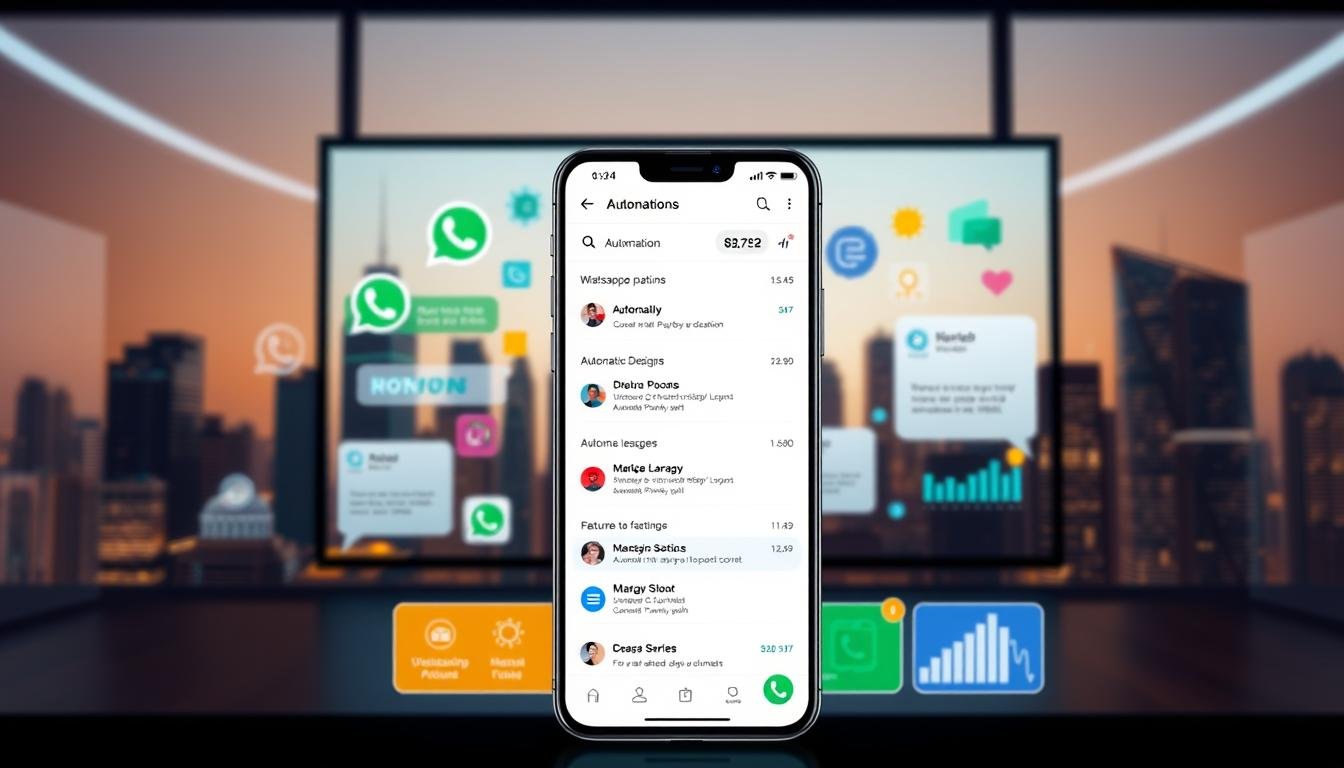Are you still managing customer interactions manually? In today’s fast-paced world, businesses need smarter ways to stay ahead. Imagine handling thousands of messages, providing instant support, and integrating all your data seamlessly—without writing a single line of code.
Over 3 million users already trust platforms like SendPulse to simplify their operations. Tools like Landbot’s official API integration make it possible to set up advanced workflows in just 1-2 weeks. Whether you’re using personal account solutions or business API options, the benefits are clear.
From 24/7 customer support to CRM integration and bulk messaging, these tools are transforming how businesses communicate. Ready to take your operations to the next level? Let’s explore how you can achieve this effortlessly.
Key Takeaways
- No-code solutions simplify business communication.
- Over 3 million users trust platforms like SendPulse.
- Landbot’s API integration takes 1-2 weeks to set up.
- Personal account tools differ from business API options.
- Benefits include 24/7 support, CRM integration, and bulk messaging.
Introduction to WhatsApp Automation Without Code
Efficient customer interaction is no longer a luxury—it’s a necessity. Businesses are adopting tools that simplify communication and enhance productivity. One such solution is WhatsApp automation, which allows companies to manage messages, engage customers, and streamline workflows without technical expertise.
WhatsApp automation uses visual builders to create workflows, eliminating the need for coding. This approach is ideal for businesses of all sizes, from startups to enterprises. There are three versions of WhatsApp: Messenger for personal use, the Business App for small teams, and the Business API for advanced functionality.
Platforms like SendPulse and Landbot make it easy to get started. SendPulse offers a 7-day free trial for API access, while Landbot’s onboarding team handles the entire application process. These tools ensure seamless integration and quick setup.
Maintaining a personal touch is crucial in automation. Tools like Latenode focus on preserving the human feel in conversations. Additionally, businesses must comply with WhatsApp’s policies, such as obtaining user consent for template messages.
With over 4,000 reviews, SendPulse has proven its ability to drive sales conversions. Whether you’re handling a single phone number or multiple accounts, automation tools can transform your communication strategy.
Benefits of WhatsApp Automation for Businesses
Businesses today need smarter ways to connect with their audience. Automating communication processes can transform how companies engage with their customers. It’s not just about saving time—it’s about delivering better experiences.
Improved Customer Engagement
One of the biggest advantages is enhanced engagement. Tools like SendPulse offer an 85% open rate for triggered messages, outperforming bulk campaigns. This ensures your messages reach the right people at the right time.
Additionally, platforms provide a 24-hour free response window for user-initiated conversations. This keeps the interaction flowing without delays. Automated chatbot flows also collect feedback, helping businesses understand their audience better.
Simplified Communication
Managing multiple devices and teams can be challenging. SendPulse’s multi-device collaboration features make it easier. Teams can work together seamlessly, ensuring no message goes unanswered.
Latenode’s personal account automation maintains a natural flow in communication. This ensures that even automated responses feel human and personalized.
Efficient Business Growth
Integrating tools with CRM systems streamlines operations. Both SendPulse and Latenode offer examples of CRM integration, helping businesses track and manage interactions effectively.
By automating repetitive tasks, companies can focus on growth. This leads to better resource allocation and improved scalability.
How WhatsApp Automation Works Without Code
Streamlining communication has never been easier with intuitive tools. Platforms like SendPulse and Landbot make it simple to set up workflows without technical expertise. These tools use visual interfaces to create seamless messaging experiences.
Drag-and-Drop Chatbot Builder
One of the standout features is the drag drop chatbot builder. Landbot’s visual flow designer allows users to create custom workflows effortlessly. This eliminates the need for complex coding, making it accessible for all skill levels.
For example, businesses can integrate product catalogs with Facebook Commerce Manager. This ensures smooth transitions between platforms, enhancing the customer experience.
Pre-Designed Message Templates
SendPulse offers a library of template messages pre-approved by WhatsApp. These templates save time and ensure compliance with platform policies. Users can customize them to fit their brand voice and messaging needs.
Trigger-based workflows, like order confirmations, can be set up quickly. This ensures timely and relevant communication with customers.
Automated Flows and Triggers
Automated workflows are powered by triggers, such as customer actions or specific events. Latenode provides an alternative to API setup with QR code authorization. This simplifies the process for businesses.
SendPulse also uses AI to assist in handling conversations. This ensures that responses are accurate and contextually relevant, even in high-volume scenarios.
Getting Started with WhatsApp Automation
Ready to enhance your business communication effortlessly? The first step is setting up your business account. This ensures you have the right foundation to leverage advanced tools and features.
Setting Up Your WhatsApp Business Account
Creating a business account is simple. Download the app and register using your phone number. Verify your details to unlock features like catalogs and automated responses. This setup is essential for accessing tools like Landbot’s managed application process or Latenode’s instant QR setup.
Choosing the Right Automation Tool
Selecting the right tool depends on your needs. For advanced workflows, consider platforms with API integration. For simpler setups, tools with drag-and-drop builders are ideal. Compare options to find the best fit for your business.
Connecting Your WhatsApp Account
Once your account is ready, connect it to your chosen tool. Platforms like SendPulse offer team collaboration features, making account management seamless. Ensure your Facebook Business verification is complete for smooth integration.
Key Features of WhatsApp Automation Tools
Enhancing business communication is now more accessible than ever with advanced tools. These platforms offer a range of features designed to streamline operations and improve customer interactions. Let’s explore the standout functionalities that make these tools indispensable for modern businesses.
24/7 Customer Support
One of the most valuable features is the ability to provide 24/7 customer support. Automated FAQ responses can be triggered by specific keywords, ensuring customers get instant answers to their queries. This reduces wait times and enhances satisfaction.
Tools like SendPulse also offer analytics dashboards to track message performance. This helps businesses identify areas for improvement and ensure consistent support quality.
Bulk and Triggered Messaging
Another key feature is the ability to send messages in bulk or based on specific triggers. Bulk campaign creation interfaces make it easy to reach large audiences with tailored content. Triggered messages, such as order confirmations, ensure timely and relevant communication.
Platforms provide pre-designed templates that are compliant with platform policies. These templates save time and ensure consistency in messaging.
Integration with CRM Systems
Seamless CRM integration is a game-changer for businesses. Tools allow for deal creation directly from the chat interface, streamlining the sales process. Latenode’s CRM-based follow-up automation templates ensure no lead is left behind.
For businesses with custom needs, API documentation is readily available. This enables tailored integrations that fit specific operational requirements.
Use Cases for WhatsApp Automation
Businesses are discovering new ways to improve communication and efficiency. By leveraging advanced tools, companies can handle various tasks seamlessly. From support to sales, these solutions are transforming operations.
Customer Support Automation
Providing timely assistance is crucial for any business. Tools like SendPulse enable automated responses to frequently asked questions. This ensures customers receive instant answers, reducing wait times.
AI-powered chatbots can handle complex queries. They analyze keywords to provide accurate solutions. This enhances the overall support experience.
Sales and Lead Generation
Generating leads and closing deals becomes easier with automation. Chatbots can qualify leads through structured question flows. This helps businesses identify potential customers quickly.
Latenode’s group monitoring feature tracks sales opportunities. Automated follow-ups ensure no lead is left behind. This streamlines the sales process.
Appointment Reminders and Notifications
Managing appointments is simplified with two-way reminder systems. These tools send timely notifications to both businesses and customers. This reduces no-shows and improves scheduling efficiency.
AI-driven chat summaries provide insights into interactions. This helps businesses refine their strategies for better results.
WhatsApp Automation vs. Traditional Messaging
In the evolving landscape of business communication, traditional methods are being outpaced by modern solutions. Companies are increasingly turning to advanced tools to streamline their operations and enhance customer interactions. Let’s explore how these solutions compare in terms of speed, cost, and scalability.
Speed and Efficiency
One of the most significant advantages of modern tools is their speed. Automated responses can be delivered in seconds, ensuring customers receive timely support. Traditional methods often involve manual processes, which can take hours or even days.
For example, the official WhatsApp Business API allows businesses to send messages to up to 500 users within 24 hours. This ensures efficient communication without delays. Automated workflows also reduce the risk of human error, improving overall efficiency.
Cost-Effectiveness
Cost is a critical factor for businesses. While personal accounts offer free messaging, advanced tools like the Business API come with template fees. However, the investment often pays off through improved customer engagement and streamlined operations.
Automated solutions also reduce the need for additional staff to handle customer inquiries. This can lead to significant cost savings in the long run, making them a smart choice for growing businesses.
Scalability for Businesses
Scalability is essential for companies looking to expand. Tools like Latenode support multi-number setups, allowing businesses to manage multiple accounts seamlessly. This ensures that communication remains smooth even as the customer base grows.
Platforms like SendPulse offer enterprise-level throughput capabilities, handling high message volumes without compromising performance. This makes them ideal for businesses aiming to scale their operations efficiently.
Compliance is another advantage of using the official WhatsApp Business API. It ensures that businesses adhere to platform policies, reducing the risk of account restrictions. This is crucial for maintaining trust and reliability in customer interactions.
Choosing the Right WhatsApp Automation Solution
Selecting the ideal solution for your messaging needs can significantly impact your business success. With various tools available, it’s essential to evaluate your requirements and choose a platform that aligns with your goals. Let’s explore the key factors to consider and compare popular options to help you make an informed decision.
Factors to Consider
Before diving into a tool, assess your team size, message volume, and budget. Smaller teams may prefer platforms with drag-and-drop builders, while larger enterprises might need advanced API integrations. Additionally, consider the scalability of the solution to ensure it grows with your business.
Compliance is another critical factor. Ensure the tool adheres to platform policies, especially when sending template messages. This avoids potential restrictions and maintains trust with your audience.
Comparing Popular Tools
SendPulse offers omnichannel integration, making it ideal for businesses managing multiple communication channels. Latenode, on the other hand, focuses on personal account automation, ensuring a human touch in conversations. Landbot stands out with its visual flow designer, simplifying workflow creation.
Each tool has unique strengths. For example, SendPulse excels in bulk messaging, while Latenode provides branding opportunities for personal accounts. Evaluate these features to find the best fit for your needs.
Customization Options
Customization is crucial for aligning the tool with your brand. Business API solutions often have template limits, but they ensure compliance. Personal accounts, however, offer more flexibility in branding and messaging styles.
If you’re transitioning from the Business App to the API, ensure the migration path is smooth. Tools like SendPulse provide detailed documentation to guide you through the process, minimizing disruptions to your operations.
Best Practices for WhatsApp Automation
Maximizing efficiency in customer communication is essential for modern businesses. By following proven strategies, you can ensure your messaging efforts are both effective and compliant. Let’s explore the key practices to enhance your approach.
Personalizing Messages
Personalization is crucial for engaging your audience. Use dynamic field insertion to tailor messages with names, order details, or other relevant data. This approach makes interactions feel more human and relevant.
A/B testing message templates can help identify what resonates best with your customers. Experiment with different tones, formats, and calls to action to optimize your content.
Maintaining Compliance with WhatsApp Policies
Adhering to platform policies is non-negotiable. Understand WhatsApp’s spam detection thresholds for personal accounts to avoid penalties. Ensure your templates go through the approval process, which typically takes 24-48 hours.
Regularly audit your messaging practices using a compliance checklist. This ensures your service remains trustworthy and avoids disruptions.
Monitoring and Optimizing Performance
Track key performance metrics like response time and resolution rate. These insights help you identify areas for improvement and ensure your communication remains efficient.
Leverage analytics dashboards to monitor message performance. This data-driven approach allows you to refine your strategies and deliver better results.
Integrating WhatsApp Automation with Other Tools
Expanding your communication strategy requires seamless integration with other tools. By connecting your messaging platform with CRM systems, email campaigns, and omnichannel solutions, you can create a unified workflow that enhances efficiency and customer satisfaction.
CRM Integration
Connecting your messaging platform with a CRM system ensures all customer interactions are tracked and managed effectively. Tools like Zapier allow for automated lead routing and data sync between platforms. This ensures your sales team has access to up-to-date information, improving follow-up efficiency.
For example, integrating with Salesforce or HubSpot enables deal creation directly from chat interactions. This streamlined process reduces manual effort and enhances productivity.
Email and SMS Campaigns
Combining your messaging platform with email and SMS campaigns creates a cohesive communication strategy. Platforms like SendPulse offer a unified dashboard for cross-channel campaigns. This allows you to send whatsapp messages, emails, and SMS from a single interface.
Automated workflows can trigger email follow-ups based on chat interactions. This ensures no lead is left behind and maximizes engagement across channels.
Omnichannel Communication Strategies
An omnichannel approach ensures consistent communication across all platforms. Latenode’s cross-posting template allows messages to be shared between Telegram and WhatsApp seamlessly. This ensures your audience receives the same message, regardless of the platform they use.
Centralized contact database management further enhances this strategy. By storing all customer data in one place, you can personalize interactions and improve overall engagement.
Using api integrations, businesses can create workflows that connect multiple tools. This ensures a smooth and efficient communication process, tailored to your specific needs.
Case Studies: Successful WhatsApp Automation
Real-world examples show how businesses are transforming their communication strategies. From small startups to large enterprises, companies are leveraging advanced tools to enhance efficiency and customer satisfaction. Let’s explore some inspiring success stories across different industries.
Small Business Success Stories
Small businesses are seeing significant benefits from streamlined communication. For instance, a retail store integrated SendPulse’s ecommerce catalog feature, reducing customer service tickets by 40%. Automated order updates kept customers informed, improving their overall experience.
Another example is a local healthcare provider that implemented appointment reminders. This simple change decreased no-shows by 35%, allowing the clinic to serve more patients efficiently.
Enterprise-Level Implementations
Large enterprises are also reaping the rewards. One global company handles over 10,000 daily support interactions using automated workflows. This ensures quick responses and consistent service quality, even during peak times.
Non-profit organizations are using broadcast messages to drive donations. By reaching a large number of users with personalized appeals, they’ve seen a significant increase in contributions.
Industry-Specific Examples
In the education sector, a university introduced a chatbot for course enrollment. This led to a 25% increase in sign-ups, as students found the process quick and easy.
These examples highlight how tailored solutions can address unique industry needs, improving both efficiency and customer conversation.
Future Trends in WhatsApp Automation
The future of messaging is evolving rapidly, driven by technological advancements. Businesses are leveraging innovative tools to stay ahead in customer communication. From AI enhancements to seamless integrations, the landscape is transforming to meet growing demands.
AI and Machine Learning Enhancements
Artificial intelligence is reshaping how businesses interact with customers. Platforms like SendPulse are introducing AI context tracking and emotion detection. These features enable more personalized and empathetic responses, improving customer satisfaction.
Predictive response suggestions using natural language processing (NLP) are becoming standard. Voice message processing and real-time translation capabilities are also on the rise. These advancements ensure businesses can use whatsapp and other platforms more effectively.
Increased Integration with Other Platforms
Seamless integration with third-party tools is a growing trend. Businesses are connecting messaging platforms with CRM systems, e-commerce solutions, and analytics tools. This creates a unified workflow, enhancing efficiency and data accuracy.
Augmented reality (AR) product previews in chat are gaining traction. Blockchain verification for transactions is also being explored. These innovations ensure secure and interactive customer experiences.
Evolving Customer Expectations
Customers now expect faster, more personalized interactions. Businesses must adapt by offering instant support and tailored solutions. Automated workflows that handle high volumes of messages without delays are becoming essential.
Real-time analytics and AI-driven insights help businesses stay ahead. By understanding customer behavior, companies can refine their strategies and deliver exceptional experiences.
Common Challenges in WhatsApp Automation
While messaging solutions offer great benefits, they come with their own set of challenges. Businesses often encounter technical, operational, and compliance issues when implementing these tools. Understanding these hurdles can help you prepare and optimize your communication strategy effectively.
Technical Setup and Maintenance
Setting up a messaging system requires careful planning. For instance, businesses must ensure their phone number is verified and compatible with the platform. API approval rejection is another common issue, often caused by incomplete documentation or non-compliance with platform policies.
Preventing rejection involves submitting accurate business details and adhering to guidelines. Regular maintenance, such as updating templates and monitoring system performance, is also essential. Tools with built-in analytics can simplify this process, ensuring smooth operations.
Ensuring Message Deliverability
Deliverability is critical for effective communication. Factors like spam scores and platform restrictions can impact whether your whatsapp messages reach the intended audience. Monitoring tools help track deliverability rates and identify potential issues.
Reducing spam scores involves avoiding repetitive content and ensuring messages are relevant. Backup communication channels, such as email or SMS, can also help maintain contact with customers if deliverability issues arise.
Managing High Message Volumes
Handling large volumes of messages can be overwhelming. WhatsApp’s 256-recipient limit for manual broadcasts is a common bottleneck. To overcome this, businesses can use load balancing across multiple numbers or integrate with platforms designed for high throughput.
Planning is key to managing high volumes. Businesses should start sending messages in batches and monitor system performance to avoid overload. Automation tools with scalable features ensure seamless communication, even during peak times.
Conclusion: Transform Your Business with WhatsApp Automation
Unlock the full potential of your business communication with advanced tools. Platforms like SendPulse and Latenode offer tailored solutions, whether you need API integrations or personal account setups. Start by exploring free trials to assess which tool aligns best with your needs.
Adhering to WhatsApp’s commercial policies is essential to ensure smooth operations. By 2025, 60% of customer interactions are projected to be automated, highlighting the importance of adopting these solutions now.
Take the next step and connect your WhatsApp automation within two weeks. Transform your communication strategy and stay ahead in today’s competitive landscape.







